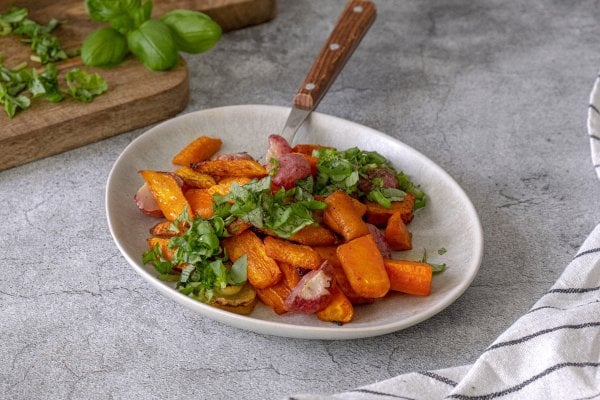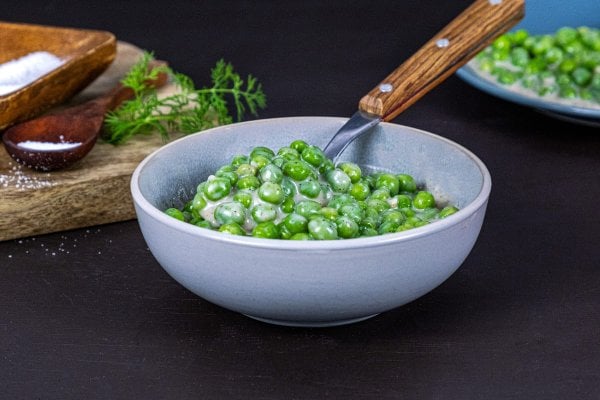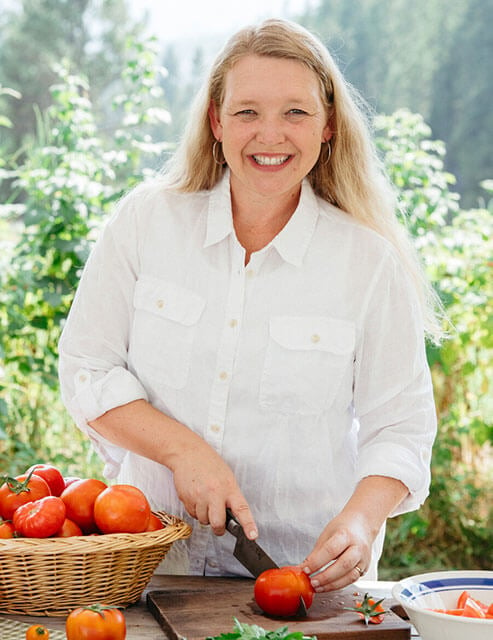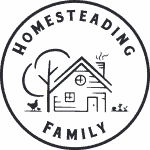Meal planning is a great way to make better choices with your grocery budget, but it’s not necessarily something we all look forward to or make time to do. So how can we eat healthy while on a budget? Join me and Tiffany from Don’t Waste the Crumbs as we share our tips.
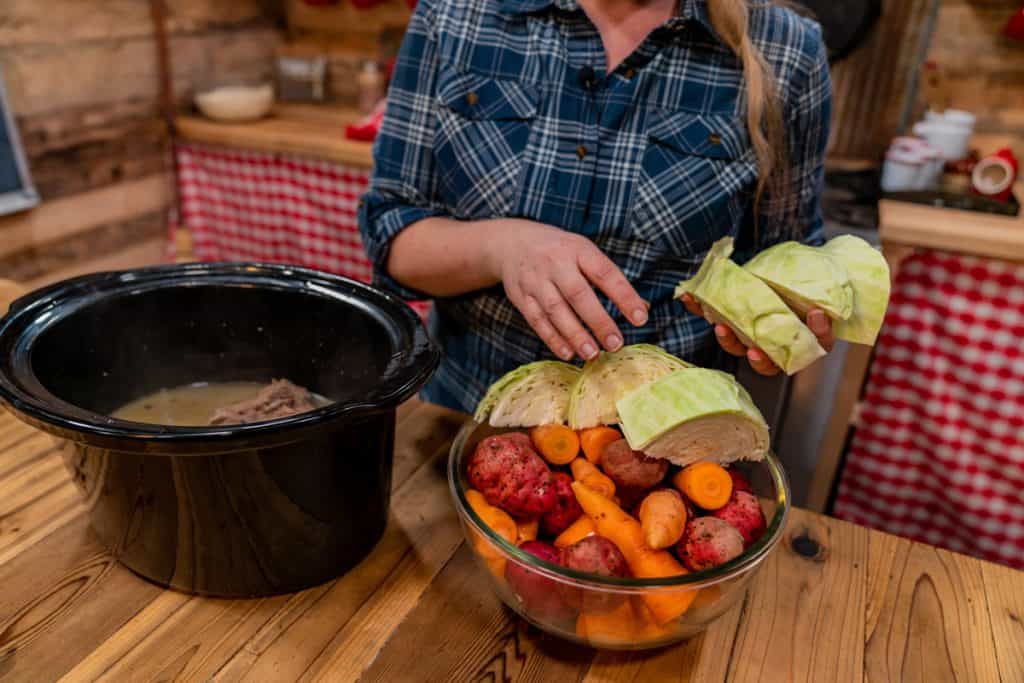
As we start the new year, most of us take a closer look at our budget and start squeezing more out of every dollar where possible. The most obvious place to look is the grocery budget. But as grocery prices and concerns about unsettling times continue to rise, how do we save money on groceries?
I’ve discussed before what meal planning on the homestead looks like as well as how to beat inflation at the grocery store and preparing for inflation and food shortages. Be sure to check out those posts for more great tips.
But today we’re focusing on how to eat well on a budget and I’m joined with grocery budget expert, Tiffany from Don’t Waste the Crumbs.
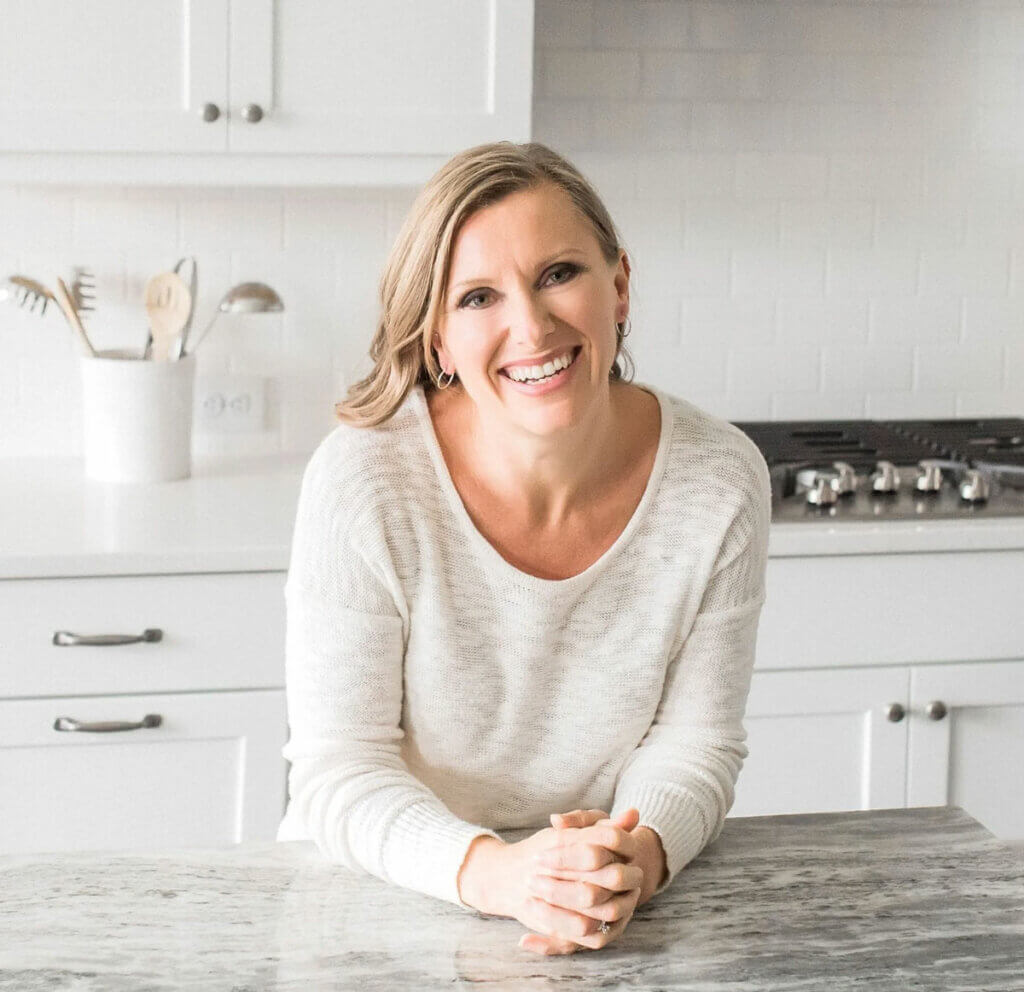
Who is Tiffany?
After starting married life with plenty of debt, Tiffany and her husband (Mr. Crumbs) decided they were going to get debt free. Because they were on a fixed income, the only area they had control over was their grocery budget.
In 2012, Tiffany started her blog Don’t Waste the Crumbs. This is where she shares the systems and tips she discovered to help her family save money in the kitchen and get out of debt, all while maintaining a healthy diet.
Tiffany believes in saving grocery money by squeezing out every dollar you can but still being able to feed your family well while doing it with real food. She teaches how to slowly go from processed, boxed meals to whole foods on a budget with a simple strategy and a plan.
Why I Love Meal Planning
Meal planning can be a sore subject for many. It’s not for everyone, and some people seem to have an easier time planning than others. Also, some people don’t want a list to dictate what they eat for dinner each night.
It’s been my experience that meal planning can work with you instead of working against you. It may be that the plans you’ve tried in the past didn’t work well with your personality, so don’t be afraid to try again.
The truth is, you can meal plan in about 15 minutes. It doesn’t have to be elaborate, but if you just sit down one day each week and put a loose plan on paper, you can avoid the otherwise panic mode found at every meal, every day.
A plan, even a loose plan, eliminates the stress at mealtime. It means you won’t reach 4 PM and realize you didn’t defrost any meat or that you don’t have the right ingredients for the meal you’re about to make.
Also, with a plan that is displayed, everyone in your family can see it and then they can help. It can become a fun team effort and something everyone looks forward to instead of something we all dread. You can even go so far as to assign different aspects of the meal to different family members, so everyone knows exactly what to do and when.
As a mom and a business owner, I’m making decisions all day long. A meal plan eliminates decision fatigue. Decision fatigue is when you’ve made so many decisions throughout the day that you can’t possibly make one more decision, like “what’s for dinner?”
And finally, meal plans can allow for more creativity and flexibility with your meals because you’re no longer pressed for time.
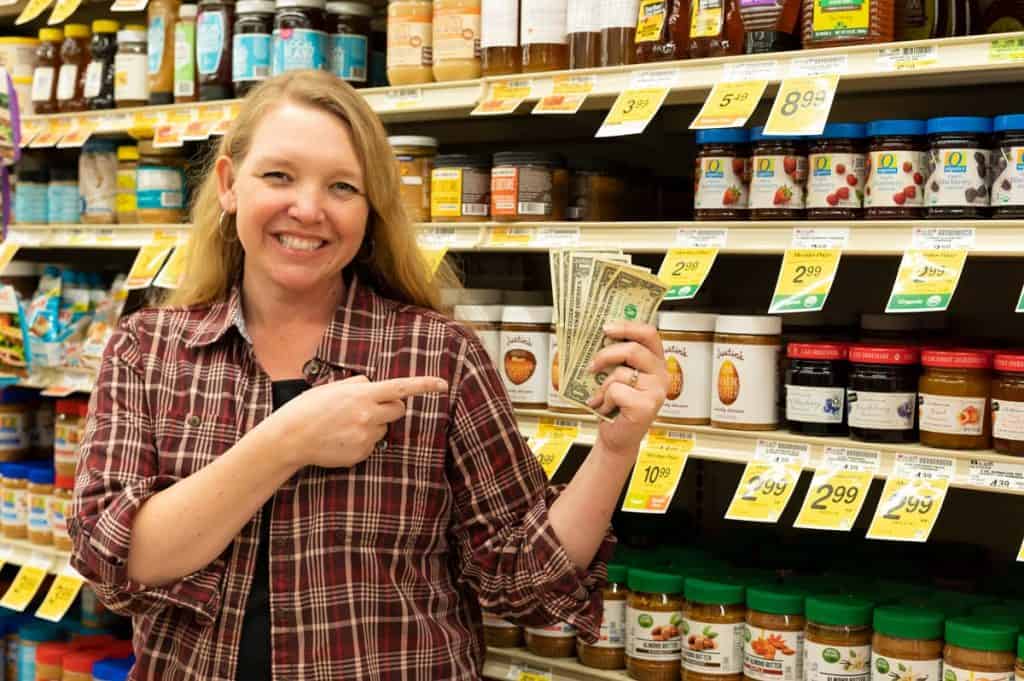
Thoughts and Ideas on Grocery Budgets
The fundamental goal of a grocery budget is to keep food waste to zero. Here are some ways Tiffany recommends meeting that goal:
- Keep your refrigerator stocked to a minimum. Tiffany and I both agree on this. If you can see what’s inside the fridge, you don’t risk something hidden going bad before you have a chance to use it up.
- Be very particular in your grocery shopping. Look for deals and sales on items you buy the most and stock up when they’re on sale.
- Use what needs to be used up first. This helps prevent having to throw out food that’s gone bad. This is one of the easiest ways to save money on groceries. Try combining whatever staples and odds and ends you have to make Hoover Stew or Potato Peel Pie.
- Keep your fridge organized and under control. This goes well with the first tip of stocking your fridge to a minimum. If you can see all your food and know what you have, you are less likely to have food go bad or buy extra of what you already have.
- Remember that meal planning is not linear but somewhat circular. All of your planning, execution and decision-making are connected.
- Meal plans need to be done in an informed fashion with intentionality and strategy.
- Meal plan for snacks as well as main meals.
- Don’t forget, you can make homemade baby food and freeze-dried baby food instead of buying baby cereal and jarred baby foods. I turn to home-cooked veggies and meats.
- An excellent place to start meal planning is with dinners. Plan to make extra and eat the leftovers for lunch the next day. We all love to cook once and eat twice.
- It is a good rule of thumb to have two backup meals. We love keeping our pantry stocked with canned convenience meals like freeze-dried chicken pot pie, white bean chicken chili, or canned beef stew. Even having canned beef or canned chicken makes for quick backup meals. If we don’t have ready-to-eat meals on the shelf, our backup is always rice and beans or a simple snacky meal of sliced meat, cheese and pickles.
- One of my “aha moments” that took me a while to figure out is to always prepare a make-ahead breakfast casserole (like baked oatmeal) for easy weekday breakfasts that are filling and nourishing for the whole family. All it takes is someone to wake up and pop it in the oven.
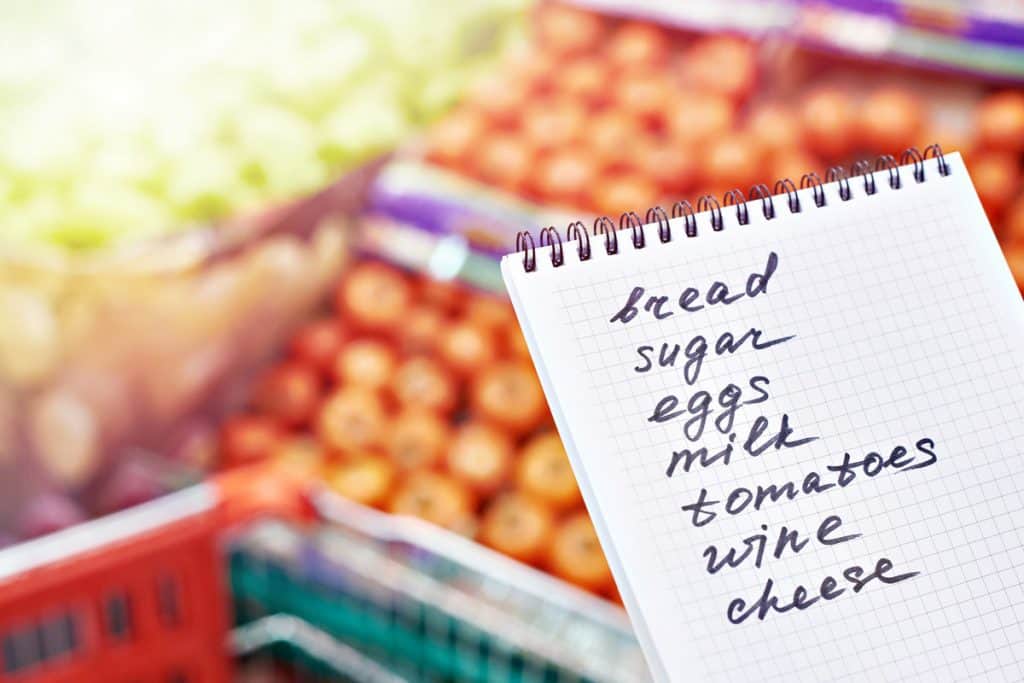
How to Budget for Groceries
There are many things you can do to have a successful grocery budget. The best place to start is with the meal plan. Have it visible so everyone knows what’s available for each meal. This will eliminate hungry snackers eating all the produce you purchased for tomorrow’s dinner.
But how do we decide how much our grocery budget should be? If we haven’t been in the habit of budgeting for groceries, maybe you don’t even know how much you spend per month at the grocery store, then you need to back up and get an idea of what you’re currently spending.
Here are some ideas to try:
- Write down how much you spend on groceries for an entire month. Make sure everything gets written down, even that tiny trip to the store for a gallon of milk.
- Once you know how much you’re spending, then you can work toward a goal. Like how much do I want to spend per meal, or per day for my family. This will look different depending on the size of your family, and the age of your children (or depending on your job, as active jobs generally require more food to keep up nutritional needs and energy).
- I guarantee if you start by writing out a simple meal plan, your grocery budget will be immediately reduced.
- Use what you have on hand, then supplement with other foods. This may look like a really creative and unconventional meal. But if it means that bananas and a few remaining cucumbers need to fit in somewhere with dinner before they go bad, I’ll bet you can get creative with them!
- Shop for what’s in season because it tends to be a better price (or on sale). This can help your meal planning be rotational based on the time of year. Then you can use the same plan next year.
- Each time you prepare food, ask yourself, “Did my meals align with my financial goals?” If you still need to, change what you are preparing and purchasing. Focus on less expensive cuts of meat, highly nutritious organ meat or savory beef tongue, or consider buying meat in bulk to save money on the per-pound price.
- Plan one month at a time. This way, you can change how much money you can save by seeing what works and what doesn’t.
- Be sure to incorporate creativity into the meals so the budgeting process doesn’t become too dull.
- Coupons can be used but tend to be ineffective. Fifty percent of what you eat should come from what you already have in your home. If you’re a homesteader and grow a large garden, and then put up food, this may be closer to 60-70%. If you live in the suburbs, this may be closer to 40%. But your meals should be made up of about 50% of ingredients you already have on hand.
- Coupons also tend to focus on non-whole food items, the things we’re trying to stay away from anyway. But if you’re a couponer and it’s been working for you, that’s perfectly fine and can be incorporated into eating healthy on a budget.
- A better option to coupons is to watch the sales flyers that come in the mail. This will highlight any produce sales, meat sales, etc. and can be a great way to make a plan before going to the grocery store.
- Keep records of the “rock bottom prices” for the things you buy most often. Then, when something goes on sale, you can check with your list to make sure it’s the best price possible.
- Try to get the best price on what you eat most often. The 80/20 rule means that 80% of your grocery budget should be spent on what you use most often, and then the 20% should be spent on extra things you may not normally eat on a regular basis.
With so many ideas to consider when it comes to meal planning and budgeting for groceries, remember that you want to keep food waste at zero. To do this, you need to see what you eat, figure out your goals, make a plan and stick to it.
Keep it simple but focused. I love how practical all of Tiffany’s advice sounds. Your meal planning needs to be helpful. She gives you the tools, tips, and ideas to keep it just that.
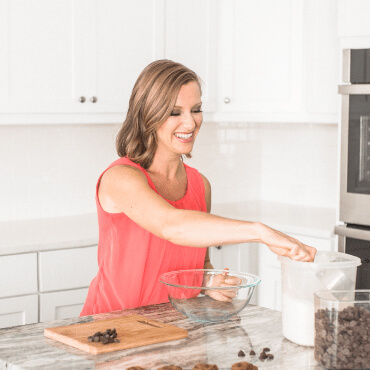
Grocery Budget Bootcamp
Tiffany is excited to offer, once again, her Grocery Budget Bootcamp. She provides this earlier in the spring and then again in the fall. This course will help you with the following:
- Learn a strategic method for eating healthy on a budget and a system to make that happen.
- Switch from processed food to real food and ways to make this way of eating even more affordable. (Try adding more real food nutrition to your diet by making homemade seasoning with organ meat.)
- Learn how to plan meals by buying in bulk and making food from scratch.
- Learn where your food comes from and where your money is going.
- Know that making certain items from scratch may not actually save you money.
- Understand that sometimes it’s worth spending more money on healthier products because you know about how the products were made or how the animals were raised. For example, the cost of buying pasture-raised eggs may be worth it because you know the “free-range” hens probably never saw the light of day.
- Learn how to organize your fridge, freezer, and pantry to help with temptations at the grocery store.
- Know how to create a budget based on where you live, allergies you may have, the size of your family, and what works best with your lifestyle.
- Use all you have learned to create and use a system that works precisely and efficiently for you.

Where to Find Tiffany
You can find more of Tiffany’s fantastic meal-planning ideas and articles here:
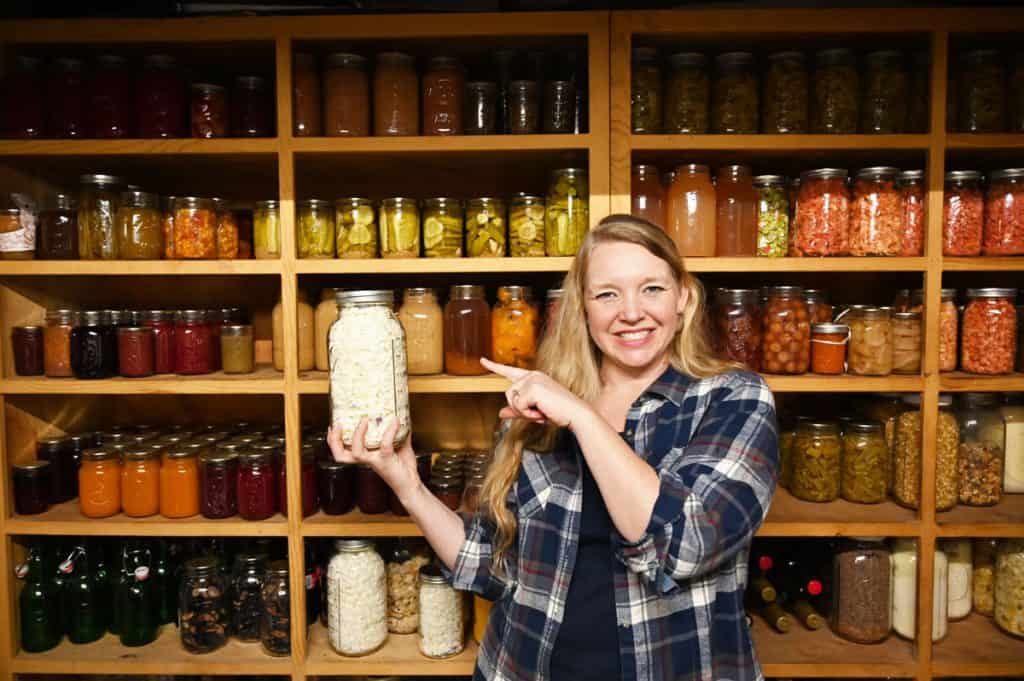
More Posts You May Enjoy
- Meal Planning on the Homestead
- Building Up a Well-Stocked Pantry
- How We Use Food Storage Barrels & Best Foods for Long-Term Storage
- Prepping Your Pantry for Preserving Season
- 7 Pantry Staples to Always Have (Never Run Out Again!)
- How to Beat Inflation at the Grocery Store
- Homemade Healthy Instant Breakfast Mix
Carolyn: Hey, you guys and welcome to this week's episode of the Pantry Chat: Food For Thought. This week we have a really fun guest to talk about something that I know is near and dear to all of our hearts. Probably every January we all start thinking about, "How do we cut down on the budget side a little bit? How do we squeeze a little bit more out of it?" But especially this January with inflation high, the grocery prices are just phenomenally high. I am so blown away by that. But then all the other things that are going on in the world that make us all kind of realize we need to get a little bit better; we need to buckle down. We need to start making a little better use of every bit of resource that we have in case. I'm not going to say in case what, because who knows?
And there's no big predictions. But I think a lot of us are feeling that. So today we're talking with Tiffany from Don't Waste the Crumbs to talk about how to get the most out of our grocery budget. How to really squeeze those dollars really, really tight. And I'm excited about this because this is a topic that for me is really near and dear to my heart. With so many kids in the house, such a big household. We've had moments where we have had an income of zero in between jobs or in between moves, and we've had to just make the most out of everything. So this is going to be a fun chat. So thank you guys for joining us today. Tiffany, welcome. Thank you so much for coming. This is going to be a good discussion. I'm excited about this.
Tiffany: It is. Thanks for having me.
Carolyn: So just introduce yourself really quickly for everybody. Tell us a little bit about your story and where you started to get to a place where you're talking about this so regularly and a lot of teaching on how to do exactly this. Where did you start? How did you get here?
Tiffany: Yeah, so the whole thing started I would say about 13 years ago. Baby number two was born and my husband and I had mounds and mounds and mounds of debt. And we had this really audacious goal to pay it all off and one day pay cash for a house. So we sat down, looked at our budget, and there's a lot of things in your budget that you can't really change. You can't really change your mortgage; you can't change car insurance. I mean, aside from shopping around. But once you do that, it's not really flexible. And then we realized that the grocery budget was immensely flexible. You could spend a lot or you could spend a little. And so we resolved ourselves to refining our grocery budget so that we could save more every month. Well, of course when you're in this money saving mode, you come up with these really random ideas and ways to save.
And I was sharing these ideas with my friends and with my family, and they're like, "You should start a blog." Fast forward, I did. After much hesitation, I started a blog, just documented everything that we were doing and it just took off from there. So we're looking at, I started my blog in 2012, so we're coming up on the 11-year anniversary. And I think what I've learned most is that there's never really an ending point. You just keep going and you keep trying and you keep refining and you keep honing your skills. And as you mentioned, what if you never know, got new babies, there's job losses, there's financial hits, there's moving, and as we get older, we're taking care of other family members. Perhaps they're moving back in. So the grocery budget is just a really great way to save a lot of money while feeding your family well.
Carolyn: And that's something that I really like about what you do is a lot of times when we start talking about cutting back the grocery budget, we start talking about extreme couponing or following the sales flyers, which can work. But a lot of times when I have looked at those options, I go, everything on the sales flyer is like boxed cake mix or sodas or donuts or things that I'm just not going to buy. I don't care how cheap they are, they don't qualify as food in my house. But you really have a whole food journey wrapped up in that also, where you're doing this, but with real food.
Tiffany: Yeah. Well, when we first started, I'll admit it wasn't real food. We didn't know real food. There was a thing about that. I thought, I grew up eating canned soup and frozen waffles. That's just what I knew. My husband grew up on five acres and his dad had a big garden. So one day he was like, "Hey, do you think we can eat more real food?" And I'm like, "Well, I'm touching it. It's real." And he's like, "No, no, I mean actual carrots, the food that comes from the ground." And I was like, "Oh, okay." In the midst of baby number two and diapers and paying off debt. And I'm like, "Okay, well I'll see what I can do," which is the wife code for like, "Yeah, it's probably not going to happen."
'Cause I look at the numbers. And so it took a lot of effort. But yeah, I realized that you can slowly, because this is not by any means an overnight transition or transformation I should say. You can go from the standard American diet of boxed and processed and just add water to a whole food space diet. And you can do it on a budget. You just need a system and you've got to know how to plan.
Carolyn: And I have this great experience with Josh, just, I don't know, a couple weeks ago we ended up at a restaurant for an event where they were feeding us foods from around Italy, but some of the foods were very peasant based. That's what they called them, a peasant dish. And it blew my mind in some ways because I feel like I've struggled to make these two things intersect in a lot of places like real food, healthy nutrient dense food, that's a really building healthy bodies and keeping the budget within control and not spending huge amounts of money. And yet here they served this meal that was this whole grain very homemade type bread, and it was soaked in a 16-hour cooked bone broth. And it made the soup as it sucked it all up, but it was more like a casserole and it was phenomenally good.
And I thought, "This is kind of the heart of real food in a peasant style that's like, it's cheap." It didn't take a lot of money. Most of that was from the waste products of something else, a little bit of flour, the bones that are left over. And so it is a very doable, but I think we have to dig a lot deeper than the information that is on the surface level when you get into the budgeting side.
Tiffany: Absolutely.
Carolyn: And I found that if I'm creative, I think I can actually do better with real foods budget wise now that I'm a long way into the journey and kind of figured out some of these tricks then I can with the grocery store, junk cheap foods-
Tiffany: Oh yeah.
Carolyn: ... on the budget. Do you agree with that?
Tiffany: Well, 100%. I would almost say that real food are ingredients and ingredients is what becomes meals. And you use ingredients for recipes. When you buy, let's say a box of cake mix. Now I know you can go on the internet and Google Pinterest and be like, add a can of 7UP and it becomes whatever. I don't even know. It becomes science experiment pretty much. But your options are so much more limited. Rather, if you started with a flour that works with your goals, especially if you have allergies, that's going to be limiting, throw that into the budget and that's a whole nother story another day. But you only need some flour and some lemon and some sweetener, and that is your box of cake mix. But at the same time, if you have those ingredients, you can do breads, you can do biscuits, you can do pasta, you can make all the things. So yeah, absolutely real food if to me essentially is the ingredients for everything else.
Carolyn: Yeah, absolutely. Now you kind of referred to this, and I think you're so right on this. Is that the transition from the store bought and I don't want to say store bought, because you can buy store bought, you can buy real food at the store.
Tiffany: Yes.
Carolyn: So I don't want to draw this line, but I guess it's more this conventional way of eating cheap foods. I don't know if there's a term for that. A standard American diet baby is what we would call that around here.
Tiffany: Or processed pre-packaged.
Carolyn: There you go. That that's the better way to go. But that transition from that processed food and that pre-packaged food over to this real food, it takes a plan. And living on real food takes a plan because real food by definition is often slow food. It's not fast food.
Tiffany: I was just thinking the same thing.
Carolyn: It doesn't mean it has to take you all day in the kitchen. It doesn't mean you're stuck as a slave in the kitchen all day. But what it does take is a lot of pre-planning and, 'Okay, tomorrow I'm going to have this, so I have to make sure that I've done these steps today so that I'm ready for that." And that that's something that this processed food that we're so used to has really untrained us from doing.
Tiffany: Oh yes. Oh yeah.
Carolyn: And so how do you approach that? What's your number one tool for, and maybe I'm trying to lead on here to meal planning. So instead of putting you in an awkward position, I know for me it's meal planning.
Tiffany: Meal planning is huge. If we didn't meal plan... With risking sounding a little bit dramatic, everything would fall apart because no one, I wouldn't know what's for dinner. So when I got little ones asking me and a husband, "What's for dinner? What's for dinner?" And I'm like, "Yeah, I don't know." And then I'm going to be stressed, the budget's going to be through the roof because I'm just buying on a whim and I'm not really going to be here being productive. I'm going to be out filling my grocery cart with things 'cause I didn't have a plan. It's very whimsical. And I think a lot of people struggle with meal planning because of that. They feel like they're put into a box. "Oh, I don't want to be told what I have to eat on a certain day." And that's where I just think meal planning has a bad rep where if people understood how you can make meal planning work with you instead of you fitting into the meal planning box, it's making meal planning work with your life, you really can reap the benefits like a 100-fold.
Carolyn: Yeah, absolutely. And I had this experience this week. Josh is traveling and sometimes when Josh is traveling the whole schedule around the house, it's a little off and a little lax maybe compared to when-
Tiffany: Oh yeah. Same here.
Carolyn: It's like, "Ah, let's take it easy. He's gone." And so usually I wake up Monday morning and my routine is after I've done all my regular morning personal care stuff that I go and I take my little household notebook and I go to my pantry and I go to where the root cellar stuff is, and I go to the freezers because we're not shopping at the grocery store, we're shopping all the things that we've brought in all season here at our place. And I look at, "Okay, what needs to get used?" And then I sit down and I meal plan for the whole week.
So this week on Monday, because we're a little loosey-goosey with the schedule, I didn't do that. Let me tell you, it is an eye opener how much chaos and how stressful that is when you're used to that schedule. Everybody can look at my sheet that I have. Everybody knows exactly what every meal is. So if somebody's like, oh, the dinner person is, "Hey, I just got invited to this thing, can I go?" The next person can look at the sheet and be like, "Oh yeah, I've got this. I can make this meal." And it's not dependent on my creativity at 5:00 PM on an over busy day already when I'm like, "What can I make fast?" And now that's where I am. And I'm like, "This is so not worth taking the..." If everything else goes away, I have to still meal plan because it just keeps the house running.
Tiffany: Well, and I mean, you can make a meal plan for the week or I can in about 15 minutes. It doesn't take that long. But when you don't have that, and now every breakfast, every lunch, every dinner, especially when you spend a lot of time at home and you're homeschooling, so you're at home a lot, you go into that panic mode. It's been referred to often as that 4:00 panic mode, what's for dinner. But that happens every meal every day. And so you spend a good chunk of your day panicking and worrying and in this freaking out where you just made your meal plan, it eliminates all of that.
And then like you said, you put your meal plan in a place where everybody can see it. And as your kids get older and your spouse, when they're home, they can pitch in, "Hey, we're having this for dinner, can I get something started for you? I have some free time." Or even you, "Hey, so-and-so come in here real quick, just watch this, don't let it burn. I'll be right back." And it becomes a team effort rather than it solely falling on your shoulders and while you're panicking, like you said, after a long day of stress, trying to now make all these decisions.
Carolyn: Yeah. And I feel like that allows for a little bit more creativity actually even for me because I'm definitely one of those people don't box me in too tight. If I start getting a schedule that's based on the clock, I get a little claustrophobic feeling like I don't know if I can breathe really clear, take deep breaths, it's okay, we can handle the clock. But I found that the meal plan actually gives me a lot of freedom and a lot of creativity. And I do use it as a tool, not as my boss. So I use it. There are days where we throw out the meal plan because I get a wild hair and I'm like, "You know what? Let's just make this thing that I love. We have the extra time, let's do it."
Tiffany: Absolutely.
Carolyn: But most of the time it's this comforting thing to know, "Okay, hey, I know it's for dinner, how can I upgrade that? How can I not just make basic spaghetti, but how can I really go to the garden and get the most out of my garden and put all these amazing flavors in and let's do extra on the salad. And wouldn't that be great to have a fresh loaf of bread that goes along with it?"
So a lot of times I'm looking at on the day of where my energy level is, where my creativity level is, what I have left at the end of the day to put into a meal or what. A lot of times the girls are cooking now, I've got quite a few older girls, even the guys are coming into the kitchen and doing a bit of cooking. And where we're at as a family, do we have a lot of time to put into dinner tonight or is it just one of those, we just got to get it done, sit down and eat? And that just allows this flexibility to come in I really like without the scramble, without the stress.
Tiffany: Well you've eliminated the decisions. Decision fatigue is an actual thing. And when you don't have a meal plan, you're not having to make a million decisions in a short amount of time. And like you said, even when you have a meal plan, you don't have to be boxed in by it, but you also don't have to decide on what's for dinner. You get to pull that out like you mentioned, how can I do this? What else can I add? It becomes more of a fun thing you start to look forward to and an act of service towards your family of cooking them a good, well-balanced nutritional meal rather than a chore of, "Ugh, I've got to do this and get in bed."
Carolyn: Yeah, absolutely. One of the things that I found for budgeting in our household that has really helped me is not keeping too much food in the refrigerator. I don't know if it's true for anybody else, but it feels like sometimes I get so much food in the refrigerator that I can't actually see what's in there. And so I start losing pieces and that's when the cilantro goes bad in the fridge drawer or this got lost and we forgot about it. And this is one of those places that I feel like is answered by meal planning is I can make sure I just have what I need for that meal.
Now I've got a lot of food all over the place, but it's in a lot more stable condition on the pantry shelf or in the freezer or freeze dried or something like that. So it's in a lot more stable condition than the food that's in the refrigerator that's working its way towards bad if I don't use it. And this is one place that just the meal planning just has really shined for me on the budget. Do you have any tips like that where you're like, "This is the thing that has really helped us save money that meal planning helps?" I'm putting you on the spot again. I'm just-
Tiffany: Yeah, no, it's all good. First when he said, you don't keep much food in your fridge, I was like, "Hmm, I don't know if I agree," but then you went on to say, "Because things are getting lost." And I was like, actually, "Yes." So keeping food waste to an absolute, honestly, it needs to be zero, food waste should be zero to help your budget. That would be the one key I would pass on to your listeners. And by doing that, you can keep your fridge at a minimum to a low. So when I go shopping, I'm looking obviously if there's good deals. I don't have a very big garden. We just moved to a rural area. I've grown up in the suburbs, so our lifestyles are a little bit different. So for us, I'm getting a lot of my food from the grocery store still, and there's nothing wrong with that, but because I don't have a garden to choose from, because I don't have a big pantry of dried or dehydrated items when I make my shopping list, I'm very particular about shopping everything at home first, which would definitely include the refrigerator.
And so the first things that go on the meal plan are the things that have to get used up. And I am probably in the refrigerator more often than I'm in my own closet. I am in there all the time because you're moving things around. What's hiding back there? What is that? I've just found over the years that the more control, or I should say more organized, I can keep that fridge and yes, keep it under control and not explode, the more money we save. And that does roll into things like taking advantage of good deals and even harvesting.
You want to find that balance of, yeah, this is a good deal, but how much are you actually going to eat? And if you're not going to eat it, what's your plan B? And I do teach all of those things. So I'm not trying to tangent here, but it all just goes hand in hand. I feel like meal planning isn't linear, it's not like it's this, this, this, this and then start over. It's more like it's all of this and everything you do is connected and everything can have a really huge impact.
Carolyn: Yeah, I totally agree with you. I think it has to be like, can we create a term that's informed meal planning?
Tiffany: Sure.
Carolyn: You have to go gather the information first about what you need to use. And that may be just going to the refrigerator and taking a critical look at it. It may be going, for me, I'm often going to the root cellar area of the basement and looking at like, "Ooh, those potatoes or those beets are starting to get a little wilty. What are we going to do with those?" But it's not just this idea that we're going to sit down and say, "Hey, tomorrow night this is what I want and the next night that's what I want." We want to do it with a little bit more of an informed fashion. And that may even be looking at that sales flyer or taking advantage. That may be the information that we're gathering is like what is it that needs to be used right now from the grocery store instead of from the retailer?
Tiffany: Yeah, I think I used the word strategic.
Carolyn: Strategic.
Tiffany: Being intentional. Yeah, like you just said you sure you can go to Pinterest and you can pick out whatever meal you want, but if you haphazardly assign it to a day, I can almost guarantee your meal plan is going to fail. And you also don't reap the benefits of meal planning because meal planning does save you time, it does save you money, but if you don't do it in that strategic intentional way, you end up with this burden of a seven-course meal on a day where you're trying to shuffle kids from cheer to basketball and you have this teeny tiny little window and then you're like, "Well, that's not going to happen. So drive through." And that just doesn't meet any of our food goals and it doesn't meet our budget goals either.
Carolyn: Yeah, absolutely. So when you're meal planning, do you plan just for dinner or how do you get as granular as snacks or what's your method for that?
Tiffany: Yeah, so when my kids were little, my kids are 13 and 14. When they were little, I did plan for snacks. And snacks were oftentimes, I guess mini meals so to speak. It would be like if we're having carrots for lunch, then carrots would be a snack as well. Or back in the day where toddlers take one bite of the banana and then they walk away. So well now that other half of the banana becomes a snack. So it was very loosely outlined and I could tailor it to whatever I happened to have in the pantry and in the fridge. Nowadays my favorite system is I really like to plan for dinners. And I believe that if you have a solid plan for dinner, breakfast and lunches and snacks and dessert if you want to, can be an outflow of that. Because going back to the food waste leftovers is a big deal.
If you don't eat your leftovers and you're cooking every night, you're going to end up with a fridge full of containers that will get thrown away because you're not eating them. So by planning dinners and including a leftover night or even being intentional with your leftovers and saying, "This is going to become a lunch." That gets part of the meal plan, you don't have to... That thought just escape me. You don't have to be super granular and write down exactly what meal you want for breakfast and what meal you want for lunch. You can be flexible in it where you mentioned your meal plan is a tool for you, you're not.
A slave to your meal plan. But I like to have my dinners plan out and then I like to have ideas for breakfast and ideas for lunch. And I usually pick three a week and I get the kids input there too, as well as my husband. So if my kids are like, "Hey, can we have waffles this week?" Well then on Saturday morning before the week begins, I'll make a ton of waffles, save some for the week and then put the rest in the freezer so that on a future week and the request for waffles comes back, I'm not at the backend call of making waffles again. And that becomes just part of rotation. And the same thing for lunch. Leftovers is always top of the list, but if there is no leftovers, I can pull bread from the freezer, we can make some pasta dish or whatever, we can make a rice dish, we can come up with something.
Carolyn: Yeah, I like that. I mean that's loosely how we approach it also. Lunch for us is always leftovers. If we don't have leftovers, which happens sometimes, everybody all of a sudden is eating more, whether it's the season changes and the activity level changes or people have a growth spurt or whatever it is. And so occasionally we'll hit these moments where it's like there are no leftovers in the house. We have two backup meals that we go to and one is rice and beans, which I am very grateful my children love. They get excited when it's announced. So I think I just hit the lottery on that one.
So it's either rice and beans, and then we'll throw in whatever goodies that we have, whether it's a fresh salsa sitting around or a little bit of cheese or some veggies, whatever it is. We'll just top it with that. The other is what we like to call a peasant meal, which is pretty much just a board of fermented, pickled, maybe a little salami and cheese. And so we'll keep a little bit of meat set aside in the fridge just to be able to have that type of a meal on a moment's notice. But those are kind of the two backups for if the leftover idea doesn't work out. For me, I had to realize at some point I had this aha moment, which said breakfast was a nightmare. And always waiting for breakfast, it was always behind, it was always frustrating. And the whole day would get off if the morning didn't start off.
So I just had to decide instead of putting this weight of myself, I really need to get up earlier and do breakfast. I'm not a morning person, I'm not a breakfast person. So I think this was this problem that I was having and as soon as I realized that and said, "Okay, instead of just getting upset with myself and trying to do better, let's work with it." And so I started making all make-ahead breakfast casserole every single week. I'm sorry for those of you guys who this is just sounds like a nightmare for, but every single week for the last maybe five years, we have had the exact same breakfasts on the exact same day on the table. We can change the toppings, we can change whatever, but we'll either have a baked oatmeal, a French toast casserole, sometimes regular oatmeal, sometimes a pumpkin [inaudible 00:27:09] custard.
We've got all these meals that we have developed out and it's somebody's job the day before to make them. It's a chore on the official chore list. And that has changed our morning. So now we have this, I guess this would be the static meal plan. It just stays the same. It is what it is. Weekend mornings we mix it up and a lot of times the kids are like, "Hey, can I make such and such? Or can I do this?" And the answer's always, "Yes," because I don't want to make breakfast. I know that. But yeah, so there is a lot of flexibility there within the idea of the meal planning. Even with that, they don't all have to be freshly planned and they don't have to depend on your creativity at 7:00 AM in the morning when you haven't even had your first cup of coffee and the baby maybe didn't sleep the night before.
Tiffany: Yeah. Oh absolutely. So I'll ask the kids for requests, but I had mentioned I bake a lot of them. That goes across the board for muffins, for quick breads, we have something similar. It's like maybe five to six things that we eat on a rotation. And it's not a planned rotation, it's a combination between what are you in the mood for and what do we have. And a lot of times it's, "Oh, I'm in the wood for waffles." I'm like, "Well, we don't have waffles. We have banana bread." So banana bread it is, but I'll bake a lot and I'll put it up for later and it gets me out of breakfast duty in the long run. But like you, so if it's banana... If it's, let's say it's a quick bread in the winter, it could be pumpkin, it could be a squash, it could be peanut butter chocolate chip, in the spring, in the summer, and it'll be strawberries and blueberries.
So it's very seasonal and the recipes don't change. And it's to the point where my kids as well, I'm like, "Hey, get those bananas, make up some bread and we're just going to stick it in the freezer for later." And it becomes a surprise when we take it out of the freezer. "Oh, what kind of bread is it?" I know what it is, 'cause I've labeled it. But sometimes we'll mix in chips or we'll mix in a swirl of something and you don't know until you slice it and it's just, I don't know, it's just something fun and it's building in variety while still doing the same thing.
Carolyn: Yeah. That I think is really important for... There's so many decisions all day long and you talked about the decision fatigue, but it's a really true thing. There are so many decisions all day long and anywhere where you can lighten that load on your-
Tiffany: Oh yeah.
Carolyn: ... brain is a place where you have some room to be creative somewhere else and something else. So I think that is wonderful. So when we're thinking about budgeting, walk us through how you would approach meal planning. I mean, are you going to do a month of meal planning? Are you going to do a week? What's your process for sitting down and getting it done?
Tiffany: Sure. So regardless of how long you plan the system is the same. You always start with the family calendar. You have to figure out what's going on in the family before you can decide what you're going to cook. Because how much time you have determines what you put on the meal plan. We talked about, I just mentioned the seven-course meal and the teeny bitty timeframe, and that's not going to work. So it always starts with the family calendar and then it starts with what you have on hand and then it gets supplemented with what's at the store or the grocery market or your local farmers and then a couple checks, is this seasonal? Going back through, did I pick everything that was seasonal? And then also did the meals I chose line up with my financial goals. If your financial goals are we need to save a lot of money, then you're not going to put things like nice T-bone steaks on your meal plan that often because they don't align.
You're going to have a whole lot more rice and beans and very simple and still delicious and still nourishing, just simple foods with inexpensive ingredients. Now, when we were paying off our debt, we had to quote Dave Ramsey. We were in this, "Gazelle-like intense focus," and we meal planned for a month at a time. That was based on our paychecks. We were paid every other week. So when we got paid, I did four weeks and then we get paid again. And I had a little supplemental for dairy and fresh produce, or if something had changed in the meantime since I first made the meal plan and I had to pivot a little bit, now we are in a one-week method on a mode of meal planning. I've also found that because I'm a food blogger, it is almost contradictory to plan long-term while trying to be creative.
So I incorporate a couple days where I'm like, "I'm going to experiment today. I've been really wanting to try this new one," and balance that out with it's burger night and it's pizza night and it's taco night, those types of things. So I would say determine what your goal is and work from there. And if you're new to meal planning, please don't jump in and do a month at a time. That is not a beginner skill. And it's okay to be a beginner. Everybody was a beginner at one point. The true heart of meal planning is simply writing down what you're going to eat. Most people know what they're going to have for lunch, about an idea of what you're going to have for dinner, and at any moment of the day.
So just putting that on paper and rounding it out. So let's say like, "Okay, today we're going to have sandwiches for lunch." "Okay, well what kind of sandwich? Are you going to put fruit with that? Are you going to put some pretzels with that? What are you thinking?" And then for dinner, if you're like, "Oh, I really want chicken." "Okay, great. Put chicken on the meal plan. Just make sure you have time to cook it. And then what else are you going to serve with your chicken?" And I think when someone who hasn't been meal planning before approaches it and they think they've got to do all the things, all the meals, all the snacks for a whole month at a time, that is a recipe for overwhelm and burnout. So I would say aim for just two to three days and just write down what you're eating. And then when you've done that, you do it again and you do it again, and again.
Meal planning is a skill. It's a lot riding your bike. The first time you learn how to do it, you're falling off like crazy and that's expected. But once you learn how to ride a bike, you don't ever unlearn. I'm in my 40s, it's been a long time since I've ridden a bike, but I have no doubt that I could go ride one if my kid was like, "Hey mom, let's go for a bike ride." I haven't lost that skill. And meal planning is the same. Once you have done it and you've practiced it and you got your head around it, you can't unlearn it. And then you can also dive deeper into, "Well, what does four weeks look like from my family? What does a rotational meal plan look like?" Where it's almost... I've had a student who made a meal plan for baseball season. She called it her baseball season meal plan.
She said between practices and games and being on the road plus her other kids and family commitments. She was like, I literally, she did it for a season. She loved it so much. I was like, "This is what I'm doing every year." And then I've had students who do it based on the seasons. They have a summer meal plan; they have a fall meal plan. So if you're out in the garden, if you know you're going to be out in the garden planting or harvesting or you're going to be busy in the kitchen putting up what you have harvested, it's not the end of the world to make a meal plan for a couple weeks and then reuse that for a couple weeks. But again, all that is very advanced when you're just starting out. It's two to three days till you get the hang of it and then you repeat, repeat and repeat. And then when you feel comfortable, you're like, "Okay, let's aim for four days. I'll think for five."
Carolyn: That's great. So when you're talking about the strategic side of it and you get to a place where you're ready to start, let's say bringing in some other resources of knowledge, of information, what is it? Do you pull the sales flyers from the grocery store or do you coupon or what is it that you do personally to make that work?
Tiffany: Sure. So I don't want to say I coupon per se. I used to coupon. I used to be, I would've classified myself as what's the word, extreme? Extreme couponer. I don't do that much anymore. If my grocery store has digital coupons linked to my card, I clip them. 'Cause I would be silly not to, but I don't go out of my way looking for coupons instead strategically speaking, again, family calendar, what you already have, that's huge. My personal recommendation is 50% of what you eat should come from what you already have. Depending on where you live, if you're a homesteader or you're a farmer, that's probably going to be a bigger percentage. If you're more suburban, you might be in that 40%, especially if it's a small kitchen. You have small storage. I like to aim for 50% and then supplement with what's on sale.
So you'll go to the sales circular and instead of coupons, I know what the rock bottom price is for the things I buy most often. And if you're not sure what you buy most often, think about what you eat a lot of. Do you eat a lot of chicken? Do you eat a lot of rice? Do you eat a lot of butter. We want to think pantry too, not just what we see on our plate, but the ingredients we use to create what's on our plate. And if you can get the best price possible on the ingredients you buy most often on the food you consume most often, that will equate to 80% of your grocery budget. It's that 80/20 rule we focus on a little bit, but that little bit is what yields the most savings.
So when we first switched from processed food to real food, I really, really wanted to keep couponing. I enjoyed it. There was a little bit of a thrill from it, but then I started realizing that there's just not very many coupons for the food we were wanting to eat. Every now and then Kroger will send me a coupon for carrots, not like over the moon, but they only send it to me because I've bought carrots from them in the past. So couponing is not a good strategy when you're aiming to eat whole foods, a much better strategy is to know what things cost so that when you see them on sale at a better price, you buy a little bit extra and you're not paying full price all the time.
Carolyn: Yeah, that sounds really reasonable. I think there's an element of just like we're talking about the freedom of meal planning because it frees you up from making all those decisions. The work of the couponing is it's a job, it is keeping track of all those things. [inaudible 00:38:17] job. So being able to free yourself a little bit from that. But I found the same thing. The amount of times that just a good solid bag of organic beans goes on sale, it's not very often compared to the things that I'm just not going to buy the processed foods. So it becomes better to do exactly what you're talking about and know the base price.
And if you have the time to put into the job side, it might be better to know the base price at your multiple local sources of finding food. For a while I had the time, but I didn't have the money. And so I literally knew I had a little notebook and I knew what these things cost at the different stores and it was like, "Okay, I'm here for this and I'm going here for that." And at the time that made sense for the lack of money. Now it wouldn't make very much sense for me to drive all the way around to all the different places for a couple of cents difference. But we're at different places in our life at different points and it's good to be responsive to that, I guess.
Tiffany: Yeah, absolutely.
Carolyn: You teach a lot of these things in a program that you have, which is the Grocery Budget Bootcamp. Can you tell us a little bit about that? Because I'm really intrigued by that. This is something I wish I had had many years ago when I was trying to learn this. "Please somebody hold my hand through this," but what is it and what kind of things do you teach in there?
Tiffany: Yeah, well that's why I created the course I wanted. I was like, "Where was this when I started?" So I teach this course every spring and every fall. So we have another class coming up in just a couple months headed into spring. Grocery Budget Bootcamp is essentially the strategic method for eating real food on a budget. And it's a system. So when you are looking to switch from processed food to real food, you're going to go out there, you're going to Google, you're going to go to Pinterest, and you're going to be like, "How to save money on real food." And you're probably going to see a lot of my articles, at least I hope you do. But you're also going to see things like, "You need to meal plan, you need to cook from scratch, you need to buy in bulk, you need to do all these things."
And so you're going to go and because you're trying to save money, you don't really want to buy a course, you're like, "I'm just going to wing it. I'm just going to DIY it." You're going to do all these things and you're going to see some success. You will see probably some good short-term success. Your meal planning will work for a few weeks until you get tired of doing it. You're cooking from scratch will work until you're tired of doing it. And so where my course comes in is the very first thing we do is we build a foundation. And that 80/20 rule is part of that foundation. It's realizing where is your money currently going and let's make sure it's going to the things you're eating most often. I like to use the example of chicken and mustard. If you eat a lot of chicken, you're going to want the quality of your chicken to be good.
Now, whether you choose conventional or you choose organic or you choose pastured is 100% up to you and based on your budget. Because to be honest, when you don't have teeny tiny little budget, there's going to be a lot of things you just simply can't afford. And that's not a personal thing, that is a money thing. It is like a black and white thing. You can't buy a Lamborghini on a Prius budget. It just doesn't work like that. So we build a foundation, we talk about the 80/20 rule. We build a budget that works for you. We take into consideration where you live, if you're rural, or if you are not, or if you are in a big city, those play a role. If you have food allergies that plays a role, the size of your family plays a role. If you have a family of two, your budget's going to be smaller than if you have a family of 12.
Again, that's a number thing. You can't change that. So we talk about all that. We have the foundation and we also establish... this one's important, your priorities, what type of quality of food do you want to buy? And then making sure you understand what that quality means. I think a lot of consumers think that certain labeling means food is better. I love using the example of eggs because you're a homesteader. I'm sure you've got some chickens. We've got some chickens too. And they're right out my window just blowing around. That is called a free-range chicken. It is out on the range and they're free to do whatever they want to do. But when you buy a free-range chicken eggs at the grocery store, it is not that much of a difference than the typical grocery store, conventional egg, they're still in a closed space.
They have a teeny tiny little door, but odds are they've never actually seen daylight. And so it's really important to me that my students understand the why behind what they're doing. Because saving money is 50% doing and 50% mental, and that includes the education. So we build a foundation and then we segue into those hard skills, meal planning, food waste, cooking from scratch. But we're also taking, looking at that from the point of view of what actually matters.
If you are allergic to wheat and grains don't sit well in your belly, then baking bread from scratch doesn't really make a whole lot of sense. So why would you do that? Maybe you host company and you'd like to have a loaf of bread on the table for them. It is worth every penny to go to the store and buy that loaf of bread than it is for you to buy the ingredients and spend the time learning how to make one loaf that may or may not turn out, to be honest with you. Because bread making is a skill. And then to have those ingredients sit and possibly go bad because you don't consume them on a regular basis.
So we really talk about what you eat, what should you be making from scratch, and then keeping in mind time it takes to make that from scratch. And the money aspect of, is it actually cheaper to make it from scratch or not? I learned the hard way that it is not cheaper to make ketchup from scratch. You need a whole lot of tomatoes and you need some time. And I had a local grocery store that had bottles of organic ketchup on sale for a dollar. And I was like, "You know what? We're done. We're going to buy ketchup." So it's things like that. What is worth buying? What is not worth, I'm sorry, what's worth buying with cooking from scratch versus what's not?
And then we come to the tail end of the course, we start wrapping it up. But before we do, we talk about organization. And I feel like this is a lost skill when it comes to eating real food on a budget. Being organized in your fridge, in your freezer, in your pantry can make the world of a difference in your budget. And I'm not talking about there's a lovely company out there who has amazing, beautiful labels and they're all color coded. And I'm not saying you have to go to that extreme, but I am saying, you should be able to open your pantry and not be embarrassed if your company is over. You should be able to open your deep freeze and say, "I know where the ground beef is, and I've probably got three to four packages of it." It doesn't have to be exact, but we need to be organized.
And how that plays a role is when you're at the grocery store, you are tempted all the time to buy all the things. "Oh, I should get more peanut butter just in case, my family really loves peanut butter. We're probably low on, I don't know, organic flour. We're probably low on this item," and you're going to put it in your cart just in case. And then you're going to come home and be like, "Oh my gosh, I already had 10 of these and now I have 11." So being organized helps us to not buy the things we really don't need to buy, as well as use up the things we need to use up. We like going back to the fridge, things are hiding in the back. They hide in the back of the freezer and the pantry as well. You'll find a half-box of random crackers that are not tasting very good because you opened them up, you took a serving, and now they're stale.
But we still need to find a way to use it up. And then the last lesson is taking all this, everything you've learned and creating it into a system that you can follow week after week. So it always starts with step one is this, step two, step three, and then back to step one, step two, step three. And the more you do it, the more you save, that snowballs. And the next thing you know have this huge slush fund that came from your grocery budget and your family's telling you, "Mom, dinner was amazing," and your husband's like, "I feel like I'm eating like a king." And you're like, "Yeah," you feel that you're proud of yourself, you've done something good because there's that mountain of, "How in the world do I eat real food on a budget?" You're like, "I'm doing it. I'm actually doing it."
Carolyn: I just love how practical that sounds because I know for me, I'll sit down and I'll design like, "Okay, I've got to get organized, I've got to do this, I've got to do that." And yeah, I spend a lot of time on Pinterest or on Google or somewhere like that, and I come up with this plan that would be Pinterest worthy itself. Like, "Ah, it's this beautiful plan," but when it comes to actually implementing it's not practical and it doesn't actually work. And so we have to get out of that the ideal and make it what actually happens when you're doing real life and you have to live with this plan. You need to make it successful there. So that is super exciting.
You guys. If you are at all interested, make sure you check out the program as soon as it opens up and we'll put a link below to information about when that'll be. But check it out. And if you haven't been over to, don't waste the crumbs. It's at dontwastethecrumbs.com, is that correct?
Tiffany: Yep.
Carolyn: So you can go jump over there and Tiffany has so many amazing resources, great articles, all sorts of great things for you. So make sure you go and check that out. Thank you so much for coming on and for hanging out with us and having this discussion. I think it's going to be really helpful for a lot of people.
Tiffany: I hope so.
Carolyn: All right, we will see you guys soon. Goodbye.
Speaker 3: Thanks for listening to this episode of The Pantry Chat: Food For Thought. If you've enjoyed this episode, please subscribe, rate and review.
Speaker 4: To view the show notes and any other resources mentioned on this episode, you can learn more at homesteadingfamily.com/podcast.
Speaker 3: We'll see you soon.
Speaker 4: Goodbye.
Sign up to receive email updates
Enter your name and email address below and I'll send you periodic updates about the podcast.











